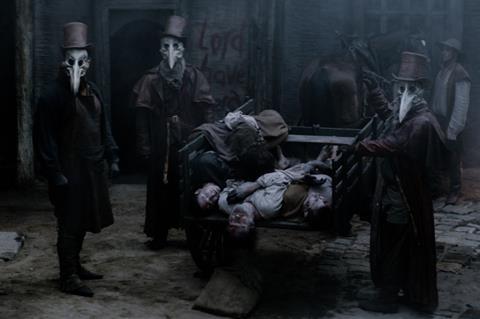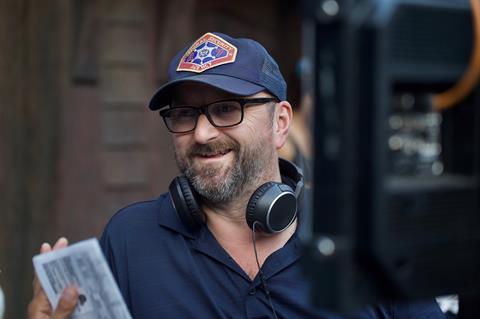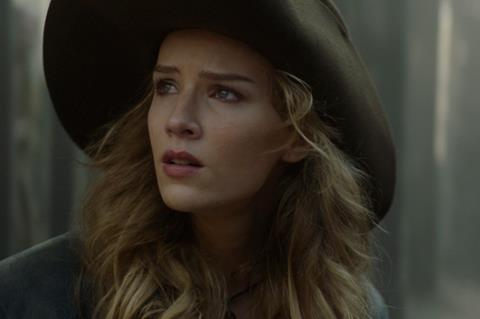
Genre filmmaker Neil Marshall kicks off this year’s virtual edition of Fantasia International Film Festival with opening night selection The Reckoning, marking his second opening night selection after The Descent in 2005.
Set during the Great Plague in 17th century England when paranoia, accusation and witchfinders stalked the land, The Reckoning follows the plight of Grace Haverstock, a woman accused of being a witch, and echoes the hysteria and misinformation that informs the current state of the world.
In his first published interview about the film Marshall, whose credits include Dog Soldiers, Doomsday, Hellboy, and Game Of Thrones, talks to Screen about why the project appealed to him, his leading lady Charlotte Kirk, the joy of Fantasia, and regaining control over his work.
The film is a Fourth Culture Films production in association with Bondit Media Capital. It was financed by independent investors and the Hungarian tax credit. Highland Film Group handles international sales.
Shortly after the interview, news broke of the Ron Meyer imbroglio allegedly involving Kirk, who co-wrote The Reckoning and is Marshall’s fiancée. The British director declined to comment on developments when Screen reached out on Wednesday, however on Thursday he denied reports of any involvement to another outlet. In light of the situation, Marshall and Fantasia agreed to cancel the post-screening virtual Q&A that was to feature the director and Kirk so as not to distract from the film.
Fantasia runs from August 20-September 2. Cick here for the full line-up. This interview contains mild spoilers.
How did this movie come about?
After the miserable experience of making Hellboy [2019] I wanted to do get back to my roots do something that I had creative control over. And Charlotte and I spent 2018 co-writing two different scripts and one of them was The Reckoning. I think mainly because it was me returning to horror for the first time in a while was probably the biggest draw initially, so that was the one that took the lead in the race.
What did you hope to accomplish with The Reckoning?
I didn’t want to make a two-dimensional horror film that was just about a bunch of scares. I need some substance, and if I’m going to tell a story it has to be horror on multiple levels and have something to say. Initially we were developing a story that was a bit more Carrie-esque, where someone’s accused of being a witch and it turns out she really was and then she was going to zap people with thunderbolts coming out of her eyes. I wasn’t really feeling it. Then Charlotte said, what if there were no witches in the film, so we left it ambiguous. That suddenly got me interested.

What stuck out from your research of the period?
I learned about these poor women, it was mostly women, who had to endure various tortures and persecution at the hands of men for centuries. And it happened for the most ludicrous reasons – maybe there’d been some personal vendetta, or someone had ginger hair and freckles. The reasons for women being accused of being witches were just outrageous. The church didn’t help much.
I was interested in that notion of persecution, particularly at that time when the Great Plague came to England. I found this amazing piece of information that because they were hunting witches, and because cats are associated with witches because they were considered the witches’ familiars, they were killing cats by the thousands because they believed that the witches were causing the plague. But by killing the cats by the thousands, they allowed the rats to proliferate and the rats were spreading the plague. I thought that was fascinating.
The timing of this story now is uncanny given what is happening to the world in 2020
When we when we were making this film we had no idea how dramatically the world was going to change: that there would be a pandemic and an uprising about civil rights and persecution and treatment of minorities in society. This film suddenly seemed even more pertinent than it already was.
Where and when did you shoot?
We shot it in Hungary. I scouted some locations in the UK. The script required quite a lot of things, and literally searching online I found a studio backlot in Hungary that contained all the sets we needed including the farmhouse, which we were going to burn down anyway. We had lots of interiors in dungeons and the castle courtyard and a Tudor village. We shot at the height of summer – June, July last year. We finished shooting on August 15 last year.
Did you do any post work during the pandemic?
I was editing at home throughout the end of last year and then we were due to get into post earlier this year. I started when the pandemic hit and luckily everybody in the post-production facility in Los Angeles said somehow or other we could do it remotely from home and they just kept on doing it. It just made it a slower process that took months rather than weeks. We got the film completed in May [2020].

What preparation did Charlotte Kirk need to do for her physically demanding lead role?
I do have a bit of a track record for putting my actors and specifically my actresses through a kind of hell; the films that we do are very physical, arduous and very punishing. She took it in her stride. She was practically in every scene every day, being tortured, drenched from getting thrown into lakes, getting thrown off roofs. Charlotte did an amazing job. She did her own stunts. She learned to ride a horse from scratch. She really mucked in, everybody did. Of course we used stunt doubles whenever there was any remote danger.
How did the co-writing process work?
We batted around ideas for themes and characters verbally first, and then I’ll go to type stuff out. We both read it together and Charlotte would give notes, I’d give notes. It was incredibly collaborative and very constructive. What’s equally important is I want my female protagonists to be three-dimensional and as real as possible and sympathetic and empathetic. At the same time I also like to create really great female antagonists and that came in the character of Ursula [Suzanne Magowan], the witch who survived a burning and was like a weird convert/devotee. You can’t have a hero without a good villain.
You recruited some familiar faces. Tell us about them.
I was lucky enough to work with some of them before like Sean Pertwee [Witchfinder Moorcroft]. It’s been a while, I haven’t worked with Sean since Doomsday, so it was a real pleasure to get him back. Steven Waddington as Pendleton [a conniving landowner], Joe Anderson [as Kirk’s husband Joseph] – another great British actor. There were a few other faces like Mark Ryan, who I worked with on Black Sails, and Rick Warden from Doomsday. It was a great cast and everybody delivered the goods.
The witchfinder wasn’t an out-and-out monster. How did you approach his character?
I didn’t want to have a moustache-twirling villain. He is sympathetic to Grace’s plight. He believes she’s possessed and that the Devil is messing around with her, and she needs to release the Devil and free herself. He believes in what he does whether we like it or not. I wanted to get that sympathetic aspect to him and that’s what makes him more scary because he’s a true believer. Whereas Pendleton is an out-and-out sadist, a nasty piece of work. Sean’s character has an ideology whereas Pendleton does not and it was good to see two sides to the bad guys.
I understand a US deal is in the works. Will you hold out for a theatrical release?
Yes hopefully we’ll get a theatrical release… The intention is to release it early next year.
Is the theatrical experience important to you?
Absolutely. I don’t see that going away. It may change in some way, but that shared experience of watching a movie in a darkened room with other people experiencing the same thing is incredibly unique and incredibly precious and we don’t want to lose that.
You referred to your experience on Hellboy, where you were reportedly fighting over control of the film. Does that make you cautious about who you collaborate with going forward?
This is this the first real Neil Marshall movie since Centurion. Well I never say never, but I certainly would go in with my eyes open and make sure I’m making decisions for the right reasons.
What’s next?
Well at the moment I’m writing another screenplay. I’m trying to write something that’s Covid-friendly so we can get out and shoot it later this year. We’re building it around Covid restrictions. It’s Aliens meet Predator. Charlotte will definitely be in it. Other cast I have no idea – I’ve got to finish writing it first. It’s designed to shoot in a desert.

























No comments yet